March 2025 Reads
Yuri Herrera, David Foster Wallace, Louise Erdrich, Dino Buzzati
Today’s post is too long for email, so please do click through to your browser or the app to read in full.
Welcome to one of my monthly wrap-up posts, where I briefly review everything I read! I read widely across many genres, including classics, literary, and speculative fiction (with the occasional dose of nonfiction). With these I’m hoping to shed some light on backlist gems, perhaps push you to read outside your genre comfort zone, and also highlight which new releases are worth your time.
I’m late, I know. Was taken out by what I now believe was the flu, and to be honest I’m still not a hundred percent. Any energy I did have was poured into my How to Read and Analyse a Novel course, which I have been absolutely loving. Thanks so much to everyone who has been reading along with me!
I read some great books in March, though, and I’m excited to share them with you today. Let’s get into it.
Infinite Jest by David Foster Wallace (1996)
How does one start a review of Infinite Jest, or at least a review of one’s reading experience?1 You are either one of the people who will probably try reading Infinite Jest at some point in the name of reading books that are considered literary greats, or you happily excuse yourself from this special kind of torture (I salute this second kind, honestly). I don’t think much of what I’ll say below will move you from one camp to another, but I’ll try and put together some cohesive thoughts on this notorious novel nonetheless.
First I’ll say that this strikes me as an extremely sad book. Taking a quick glance at the blurbs on the back of my copy, it is variously described as a “comic brio”, “witty”, a “remarkable satire”. DFW himself is described by renowned critic James Wood as “a superb comedian of culture”. This is, of course, an accurate rendering of the tone in which the vast majority of the book is written—satirical and ironic. But for me, this compounds the absolute despair at the heart of this novel.2
DFW himself espoused the idea that the elevation of irony in contemporary (American) culture was detrimental; you can’t criticise that which has already criticised itself, nor is it solutions-oriented. It doesn’t offer a positive worldview, only a negative one. Of course, Infinite Jest is the perfect example of the kinds of problems he talked about, and I’m sure to some degree he is manipulating the irony ironically. Unfortunately, I don’t think this gets us away from irony, and the novel feels like it lacks for something as a result.
It’s almost impossible to capture this rambling book in a few sentences, but in short we’re in a near-future America, more specifically in Boston.3 The story revolves around two institutions; one is an elite tennis academy which was founded by James Incandenza, who, alongside having a brief tennis career of his own, also made avant-garde films. He has died in the recent past, leaving a hole in his already dysfunctional family. His son Hal is one of the protagonists of the novel; he’s enrolled in the tennis academy and is rising in the ranks, proving himself to be a tennis player worth watching. Unfortunately, he is also afflicted by a depressive “anhedonia”4, leading him inexorably into a secret marijuana addiction.
Other storylines come from the residents of Ennet House, a drug and alcohol recovery centre just a few short blocks from the tennis academy. This is all set against a background in which the countries of North America (Canada, Mexico, USA) have merged into one larger Organisation. Of course, the US is taking advantage of the Canadians, prompting the Quebec sovereignty movement to step up their efforts to gain independence from both. These three storylines refract into one another; we receive little fragments of each, alongside many (many) other stories, some of which are pretty much irrelevant to the main story thrust, and are never resolved. Oh, and there are loads of footnotes.
It’s a difficult novel to keep your head above water in, then. DFW is an extremely wordy writer. Critics say he delights in language… I guess? He certainly delights in drowning us in language.5 The novel is notoriously mundane and monotonous at times, to the point of absolute absurdity. I do think he had a talent for creating a great scene (if only he’d use it more often), and occasionally he’ll lay out an astounding sequence that builds to a climactic and memorable image or event. Some of the satire is genuinely funny. But much of this is lost in the noise. I don’t even think this is unintentional. At various points when characters criticise James Incandenza’s pretty pretentious films, we can see DFW poking fun at himself (there’s that irony again!):
Party-line entertainment critics always complained that [James Icandenza’s] entertainments’ public-area scenes were always incredibly dull and self-conscious and irritating, that they could never hear the really meaningful central narrative conversations for all the unfiltered babble of the peripheral crowd, which they assumed […] was some self-conscious viewer-hostile heavy-art directorial pose, instead of radical realism.
We can pretty much assume, considering the fact that the vast majority of these extra characters and scenes are not returned to in a meaningful way, that this is DFW’s intention with the book—a kind of “radical realism” through experimental form.
But this is not realism. And this is a supremely trapped novel to me, with a supremely trapped worldview. You can feel DFW stretching for that sincerity, that genuine connection, that heart. But it never quite gets there, both in ways I think DFW intended us to experience, and ways he didn’t. For sure his depiction of depression and addiction are on occasion moving. He astutely diagnoses that, in the absence of faith in something meaningful in the modern world, people tend to replace it with things like entertainment, or substance abuse, and that feels prescient in many ways. It’s almost worth reading the novel on the basis of its being the first ‘internet novel’ that pinpoints many of the problems we face today (he famously predicted streaming and filters, for instance). Indeed, I think it might be one the finest examples of this kind of novel, partly because it was published in the 90s.
This is where one of my major problems comes in, though. The novel almost can’t even conceive of real love or connection, and this becomes its downfall, exacerbated by that ever-present irony. The fact that the AA characters quite literally cannot stop talking about how the cheesy one-liners and emphasis on community in the organisation is genuinely helpful and somehow meaningful shows just how far the worldview of the novel is from this—it is that surprising to them. They can’t enjoy it, either, without mentioning just how nauseating it is.
At its foundation, there is a problem with the mother figure in the novel; Hal’s mother is shown to be “narcissistic” in her love for him. She is so loving, so overbearing, that he literally can’t bear it. I’m not saying this isn’t an accurate portrayal of a particular kind of dynamic, but there is a sense in which this is not just about Hal and Avril, but about all mother-child relationships.6 Not to mention I think it has strong misogynistic undertones, too. There is no true and meaningful communication between any parent or child in the book, actually, to the point that we begin to wonder… how do we get out of this cycle? What is the point? Where do we go next?7
I think this is also where the bigotry of the book comes in. The novel pretty much ticks all the problematic boxes you could think of; it’s racist, it’s misogynistic, it’s ableist, it’s homophobic, it’s transphobic. It’s so baked into the book I have an extremely hard time separating DFW from the ‘narrator’ —whatever the narrator means in this extremely fractured context—or writing it all off as satirical. The novel literally can’t imagine that anyone apart from Hal Incandenza (and Don Gately and James Incandenza if we are feeling generous) are worthy of being depicted as fully human. Everyone else gets the objectifying treatment. And perhaps this is the meaning that the book is missing, this is the part that is shouting from the sidelines, and can’t quite get in. If Hal, James, Don Gately, DFW himself, could admit more people into the ranks of full humanity, how much more connection might there be? How much more life? Would the novel sing better, and for more people? What if you saw your mother as a woman, a person, rather than the vast hole into which all your hopes and dreams fell? What if the woman nursing you wasn’t just someone to ogle?
In a way, then, I appreciate the book for what it tells me about a particular kind of mind, David Foster Wallace’s mind. A literary guy, clearly a clever guy, writing in a particular cultural environment in the 1990s. In so many ways I can feel he wants to exit this way of thinking. For example, I listened to his famous commencement speech ’This is Water’, which essentially advises people to give others the benefit of the doubt and is not dissimilar to today’s calls to ‘romanticise your life’, even the mundane shitty bits. On the surface, that’s what it says. But the language he uses to talk about other people, the way in which he couches these ideas, is very revealing to me that these prejudices are in fact not at all gone from his psyche. And I’m consistently surprised that people try to explain away the misogyny in his book as separate from his real life abusive behaviours toward at least one woman. This is the same kind of energy that I get from this novel. Like with the irony, on the one hand he is telling us to find meaning, to find connection, to find one another. On the other, he is shutting the door behind him on human subjectivity, admitting only the cerebral white guys, even as he is almost, maybe, just about to become self-aware. This, to me, is what makes this book truly sad. Perhaps it is what makes it a “profound study of the postmodern condition”, but only insofar as that statement has its own blind spots.8 Perhaps you’d want to sever the connection between DFW as man and his book, but in its sheer audacity and self-reflexive cleverness it seems to invite contemplation of its author more directly than other novels (especially as the narrative POV is not particularly well-defined).
Is it successful as a novel? I wouldn’t say it was an example of a particularly brilliant version of this form. It’s an interesting artwork, sure, but I don’t think it maximises the potential of what a novel like this could be like. I think his editor should have been more ballsy. I don’t think all the experimentation works, and I can imagine a more effective version of this book, even within DFW’s limits—one that is better structured and more intentional. I wouldn’t want to get rid of all those unconventional elements, but I certainly felt that it could have been strengthened in several areas, particularly the main story. It is layered with meaning in some places, in others crass and unnecessary. But the book is what it is: a product of a particular time, place, man. The literary hysteria surrounding it and the PR campaign that was launched upon its publication are interesting enough in themselves. Why do many critics trip over themselves to proclaim this kind of book a masterpiece? Why do we equate ‘infuriating to read’ with greatness? And why this man, with this book?
I read for many reasons, and one of the main ones is to garner a good understanding of literature as a whole (an impossible task, but a pleasurable one to pursue). This means reading highly influential or lauded books like this one, and seeing how they fit into my sense of the web of literature. So I’m glad to have read it. Like with Rachel Cusk’s Outline, it gave me a lot of food for thought on the author/book boundary, a boundary I continue to complicate after many years of diligently separating the two in my academic work. I think if you want to read a book that communicates the utter despair of modern culture through the lens of a man incapable of imagining life outside the bounds of his own experience, this is the book for you. Otherwise, I don’t know that its occasional brilliant passages are worth the slog.
Kingdom Cons by Yuri Herrera trans. by Lisa Dillman (2004)
This month I read two of Herrera’s slim novels, and loved them both. He is fast becoming a favourite author of mine. Everything I read of his helps me contextualise his work a little better, and makes me appreciate it all the more.
Also, let’s just get it out of the way, because we all know it’s coming. I am quite literally obsessed with the way Lisa Dillman translates his work, and I love reading her translator’s notes almost as much as I love reading the novels themselves. I hope one day to read the Spanish, but whatever magic she does when translating gives me what I think is probably an accurate sense of Herrera’s really unique style. Their collaboration is alchemical perfection.
In this novel, we follow Lobo, a musician whose talents land him in the “court of the King”, a heavyweight drug trafficker living on the Mexico-US border. He’s never referred to as that, though. Instead the novel is couched in this courtly terminology, creating a mysterious fable-like quality whose atmosphere will haunt you long after you close the book. There is real musicality to the language, as Lobo (now the Artist) composes corridos for his new master. But over time—and in the throes of a love affair—he must decide if it is worth giving his talent over to this man.
This novel was Herrera’s debut, and perhaps it occasionally suffers from being a little too heavy-handed in its depiction of this lifestyle. But overall, I was left very impressed. He’s one of those authors who you step back from and think… how is he doing that? What I love about his work is that although these novels are short, they feel like wholly fleshed out worlds. I really took my time with both of these and felt they rewarded that. He has a remarkable ability to write a compelling story and marry it with a poetic approach that elevates the text and often takes it somewhere totally surprising or strange. Having read so many wishy-washy short ‘lyrical’ novels, the weight Herrera’s words carry are always an absolute pleasure to encounter—every sentence here is doing some integral work.
The Transmigration of Bodies by Yuri Herrera trans. by Lisa Dillman (2013)
This novel is in a slightly different mode. It is less vague and mythical, and more precise. Though there is always an element of mythologising at work in his books—I mean the main character here is called the Redeemer, after all. Anyway, look at the tension he builds in this killer opening:
A scurvy thirst awoke him and he got up to get a glass of water, but the tap was dry and all that trickled out was a thin stream of dank air. Eyeing the third of mezcal on the table with venom, he got the feeling it was going to be an awful day. He had now way of knowing it already was, had been for hours, truly awful, much more awful than the private little inferno he’d built himself on booze. He decided to go out.
The unusual but evocative vocabulary choices! The questions we are left with—why is there no water? What is going to be so awful about this day? Why has he been drinking himself into a stupor? So much is achieved here so quickly.
The Redeemer is a fixer living in a local town. He’s called upon by two families to find out what happened to their children, Romeo and Baby Girl. Both have gone missing, and each blames the other family. Yes, it draws on Romeo and Juliet, though perhaps the pair of star-cross’d lovers is not who you expect. The problem is, the “quiet of the streets” has not been disturbed by brawls between these families, but caused by a pandemic. The Redeemer heads out into the eerily quiet town making inquiries whilst always desperate to get back to his own love interest who lives across the hall, Three Times Blonde.
There is a noirish feel to this book, and with it comes some of the tropes you’d find within that genre. The Redeemer is your typical anti-hero, a hard drinker and a smooth talker. The first part of the book is almost entirely dedicated to his seduction of his neighbour. But I felt it served Herrera’s purposes nicely as the novel developed, and so did the Redeemer. I found the ending surprisingly moving as a result. It’s subtle, but it’s effective.
I have only his nonfiction book about the El Bordo mine fire and his latest novel Season of the Swamp to read before I become a Herrera completist, and you best believe I’ll be picking both up at the earliest opportunity.
In the Night Garden by Catherynne M. Valente (2006)
The first hurdle to talking about this book is describing what happens in it in a way that won’t immediately make you want to run a mile. It has a One Thousand and One Nights–inspired structure, where the framing narrative involves a girl telling a young prince a selection of stories that read like folktales over successive nights. This girl has been banished to the gardens of a palace for an unknown reason, though she may be under some sort of enchantment. Her eyes are surrounded by black rings which upon closer inspection are formed of thousands and thousands of tiny words—the words that make her stories. The prince sneaks out of his palace home to hear them night after night.
From what I can tell from a brief bit of research, the novel differs from One Thousand and One Nights in that it exaggerates this framing idea. The novel is split into two books and each book contains one overarching story. But within each story are nested many others. At points, we are in a story within a story within a story. When you surface from one of them back up through the layers, you experience a small shock of recognition—oh yes, that’s where we got up to.
All in all, this should be a very annoying book. Just when you get momentum on one story, you dive into another. How do you even keep track of them all? Plus, as you may well know because I’ve mentioned it many times, I am suspect of contemporary authors using folktales or creating their own folktales. It is very often done extremely badly. But somehow it all works! Valente is confident in her control of the narratives, and they flow nicely. I never truly felt lost, and was always able to remember where we were when I went back up a layer (a condensed reading schedule would probably work best for this, though).
I believe one of the major hurdles to using folklore successfully in the contemporary novel form is length. These sorts of stories were never intended to work with the longer page count complexity requirements of the modern novel. But by using this form, Valente is able to capture some of their brilliance, whilst still working at a larger story scale, weaving them lightly together. And she writes them really well! Of course there are some stories that aren’t quite as compelling, but for the most part she clearly understands the form and what makes it so great. It requires mystery, tension and strangeness. It need not deal in psychological realism, but its characters should have distinctive voices and magnetism. The world she creates is fully formed and fascinating.
In many ways they are a feminist answer to the originals, and many of them poke fun of princes and their quests. Mostly, women save women here. Having been written in 2006, they are free of the kind of girlbossery we might find in more recent interpretations.9 There are possibly some stories in which it gets too heavy-handed and high on its own supply, but overall I was left very impressed. Very much for the literary reader looking to expand into other genres and challenge themselves to something new. It certainly gave me food for thought on the act of effective storytelling, and reminded me how much I actually really love folktales. I think that’s why I get so annoyed by contemporary authors using them badly.
Unfortunately for me I forgot that this was a duology, and I was left a bit bereft by the end. I hope to read the next later this year before I forget too much about the girl and her prince.
The Mighty Red by Louise Erdrich (2024)
In Erdrich’s nineteenth (!) novel, we follow two women, Crystal—a hard-working sugar beet hauler—and her daughter, Kismet. We know pretty much from the off that Kismet is going to get herself into an ill-advised marriage with Gary Geist, a local boy, heir to the sugar beet farm her mum works for. He seems desperate to marry her for rather cryptic reasons; he was mixed up in some tragic accident in the recent past, and finds Kismet’s presence a balm to his inner turmoil. Crystal, meanwhile, has her own set of problems with her husband, who seems to have stolen a bunch of money from the local church’s fundraiser.
I can’t help but enjoy Erdrich’s work. I just love her narrative voice; it speaks of many long years honing her craft, and a confidence that I often find missing from less experienced novelists. This novel is structured in lots of short chapters, which seems to be a form she is currently favouring, so we really only spend time with the characters in brief scenes. In one sense, I enjoy this almost disjointed approach to the narrative. It maintains pace and tension, and it kept me reading. I like that Erdrich puts her trust in us to fill in some of the gaps, and ranges far and wide into some unusual and interesting territory.
But on the other hand, I felt she could have been more generous with the story, with the characters, and with us. What it achieves in pace it probably lacks for in depth, especially compared to some of her earlier work. I didn’t feel she had the passion for these characters that would get me to really and truly invest. And it leaves some of their motivations a bit unclear; when there are a million red flags surrounding Gary, and literally nobody but him and his mum want Kismet to marry him… how exactly does this wedding come about? Whilst I’m fine filling in some gaps, I feel we needed just a touch more interiority here and there to bring the story together.
Still, I had a good time with this book. Is it Erdrich’s best, or most memorable work? Probably not. But I’ll read anything she writes. She brings a wonderful warmth and humour to her books that is reminiscent of the nineteenth century novelist—there’s something Austenite about this book—and I always feel safe in her hands.
The Experience Machine: How Our Minds Predict and Shape Reality by Andy Clark (2023)
This book explores the predictive nature of the human mind. Clark is a longtime professor of cognitive philosophy, and someone whose work I briefly studied in a philosophy of mind module back during my undergrad, so I was looking forward to coming back to him and taking a trip down memory lane. The vast majority of literature about the predictive brain has been produced since I took that module, making me feel old.
I had a sort of vague awareness of the brain as a predictive machine; that it is not so much that we take in sensory information, process it and let that inform our thoughts and actions, but that we mostly predict what we perceive, allowing sensory information to nudge our perceptions into something more accurate and useful. There was lots here that I enjoyed reading about, particularly what this means for how we think about attention, qualia (the “what it is like” of the world), and how our brains perform complex tasks with relative ease.
Like many nonfiction books, though, the best work was in the first few chapters. After that, Clark spends some time in realms he is less meaningfully informed in—his attempts to tackle what the predictive brain might mean for racial prejudice or art felt simplistic and underdeveloped. That’s not to say this man doesn’t have some serious expertise, but he could have done with extra time in these other areas.
And unfortunately he is afflicted with a kind of techno-optimism that I just can’t get on board with. When he opines on a future where humans will develop “from the outset in the presence of a suite of supportive technologies” like personal AIs, “coming online when you are very young”, I tapped out. To be fair, he only presents this as speculation on a possible future, not necessarily the future he’d like to see. But the implication is very much there—he doesn’t critique these ideas at all, and focusses on them to the detriment of insights the predictive brain might provide us of the world as it is today. I’m sure some folks will appreciate Clark’s vision, but I certainly don’t.
I learnt some interesting things from this book, undoubtedly, and I recommend it on that basis, but with the caveats above. To be honest, though, I would like to read this same book but from someone with a much more holistic, multidisciplinary view, someone who is well-versed in sociopolitics.
(An aside: a free newsletter will be coming soon about literature and the predictive brain, inspired by this book—and how annoyed I was Clark didn’t go into it more lol—so make sure you are subscribed for that.)
The Stronghold by Dino Buzzati trans. by Lawrence Venuti (1940)
I won’t go into too much detail with this one, as it was a re-read as part of the course in analysing a novel I am currently running! I also reviewed it here when I first read it under the older English title, The Tartar Steppe. Here is an excerpt from that review:
In it, soldier Giovanni Drogo is posted to half-forgotten Fort Bastiani a few days walk from his home city. Life at the fort seems essentially pointless; there is no enemy to guard from, nor has there ever been. The officers there seem in a state of stasis. And yet many of them feel this inexplicable pull to the place, and though he determines to leave after a few months service there, an enchantment drops over Drogo, too. He ends up spending decades in this nothing place, going through the same motions day after day. One of the best things about this book, and one of the reasons why I have so many pages of notes on it, is trying to work out what it all means. Is it about how/why people get themselves into monotonous, boring lives (as the introduction states, the inspiration for this book came from Buzzati's own boring job working the night shift at a newspaper)? How humans tend to live in the future, always feeling like there is more time ahead when something might happen, but never doing anything to actually bring that about? Are the soldiers protecting the world of meaning from the world of nothingness, and by being on that border find themselves in some sort of meaning hinterland? Is it about the concept of borders and national boundaries more generally? Is it about how we perceive time, what makes it speed up or slow down, how the promise of the future always creeps into what we are doing in the present? Is it more specifically about soldiers and the heroic fantasy they weave about themselves when the reality is very mundane? It is easy to make interpretations based on any of these ideas, which is what makes this novel so clever.
First of all, I think I probably do prefer this new translation by Lawrence Venuti now that I have read both. I cast some aspersions on his stated intentions with it in the course post, but as a translation I wonder if it captures the effect of the novel more accurately. I also had a sense this time around of how tightly structured the novel was. Although we are repeatedly told that nothing much is happening, each chapter advances the story and the themes in interesting ways, meaning that the tension is always maintained, even if it generally feels strange and fable-like. Overall I felt it to be a much more masterful novel even than when I first read it, and I highly recommend it.
And that’s it for March! If you have adjusted your email notifications, you may not have seen these posts (just so that you don’t miss anything that you do happen to be interested in).
Thanks for reading, everyone! In the next monthly round-up, I’ll be reviewing a lot of Gene Wolfe, my first Sigrid Nunez, and The Copenhagen Trilogy by Tove Divletsen.
I’m really going to piss people off with this one.
Before we get into it, I do know that this book is already considered “tragicomic”, but if you read on, the reasons I find it sad are slightly different from DFW’s (maybe).
A near-future from 1996, that is.
Inability to feel pleasure in normally pleasurable activities.
That’s not to say there aren’t some great sentences in here but there are also a lot of sentences. A great stylist, to me, is a great stylist almost everywhere.
If I explain why there will be… spoilers I guess? But you’d see what I mean if you read it.
After I wrote this review I read this piece, parts of which I largely agree with—there are no grown-up concerns here, treated with maturity.
A note to say that this criticism could obviously be levelled at many, many other books of a certain era. But there’s something particularly egregious about Infinite Jest. First, the intensity of the bigotry and the fact that it is so evident all throughout this very long book. Second, its reputation as a really great book that critics really love! Third, that many people seem to completely overlook these issues on that basis? As I say, I kinda think they are integral to the book’s central tenets, and not in a good way. Perhaps if we had a better sense of narrative voice in any of the third-person sections, we might have a bit more moral clarity.
This does also mean that there is an element of Orientalism about some of the tales. She obviously draws inspiration from folktales all around the world, and to some extent ‘exoticises’ them all. So at least it doesn’t have tunnel vision on what a folktale can be, and I would love to know more about her research process. But on occasion there are parts that probably wouldn’t fly today.


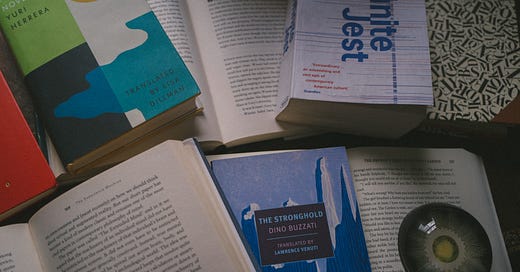



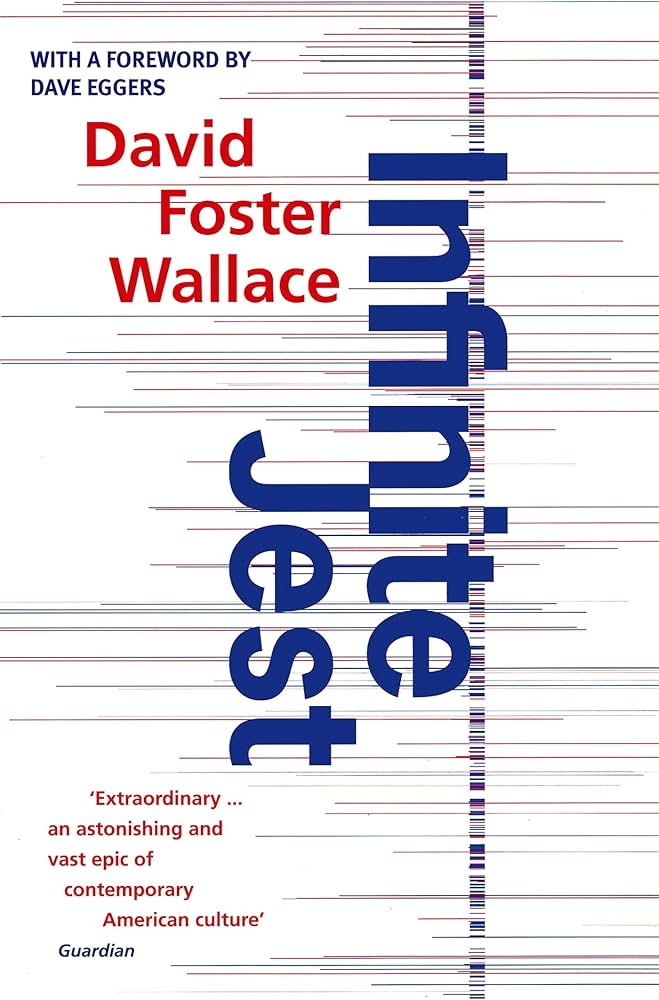
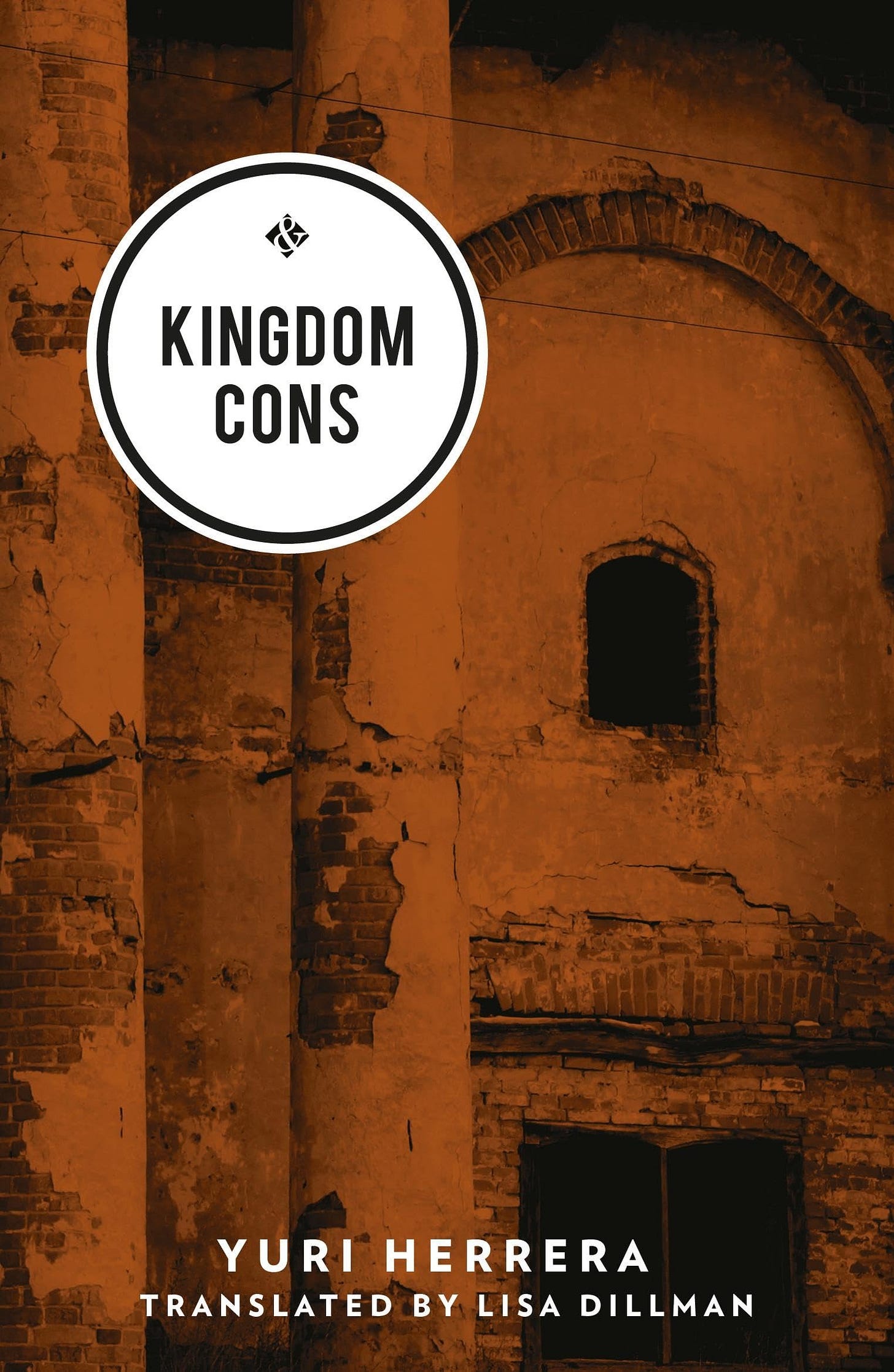
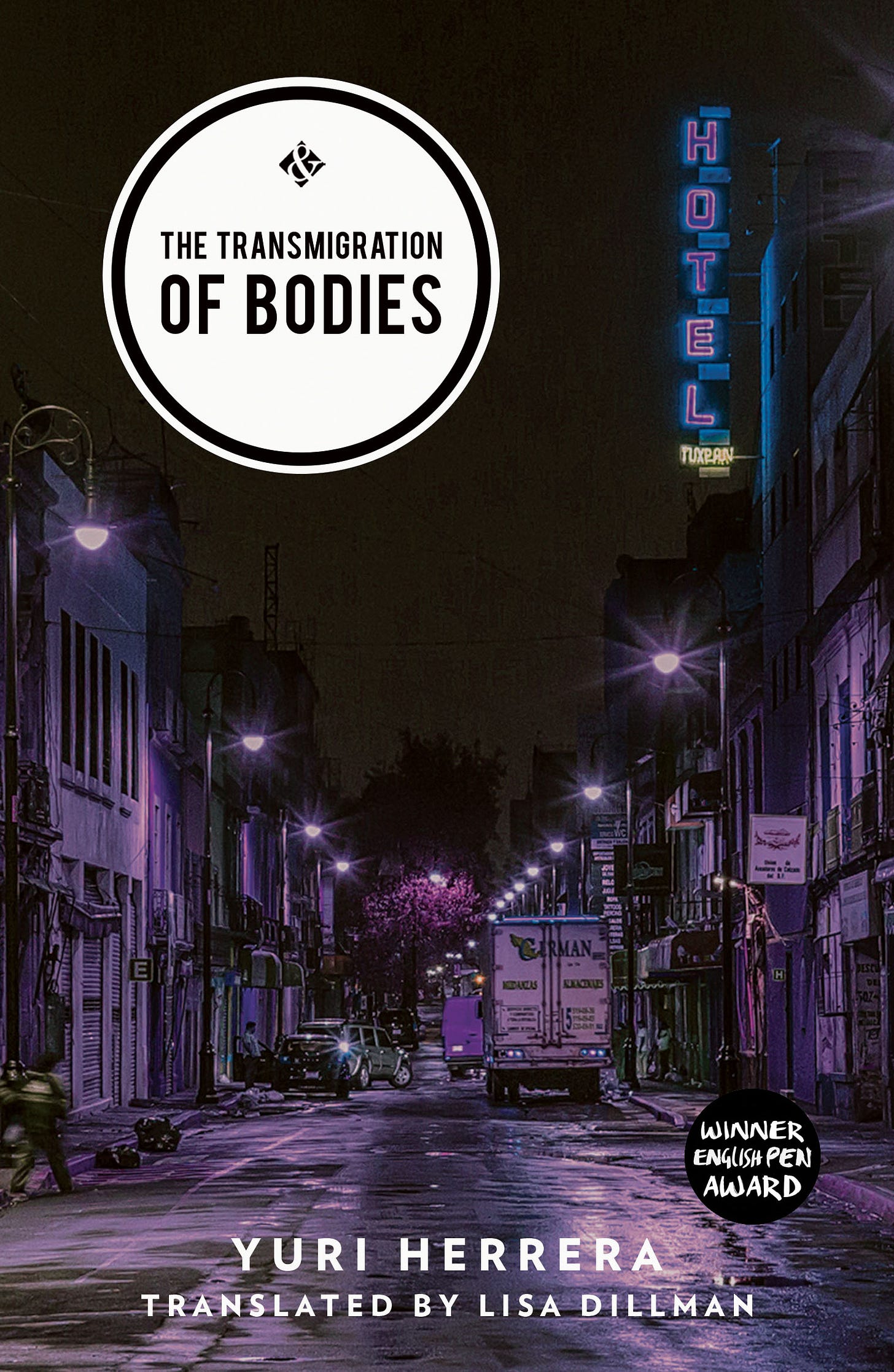
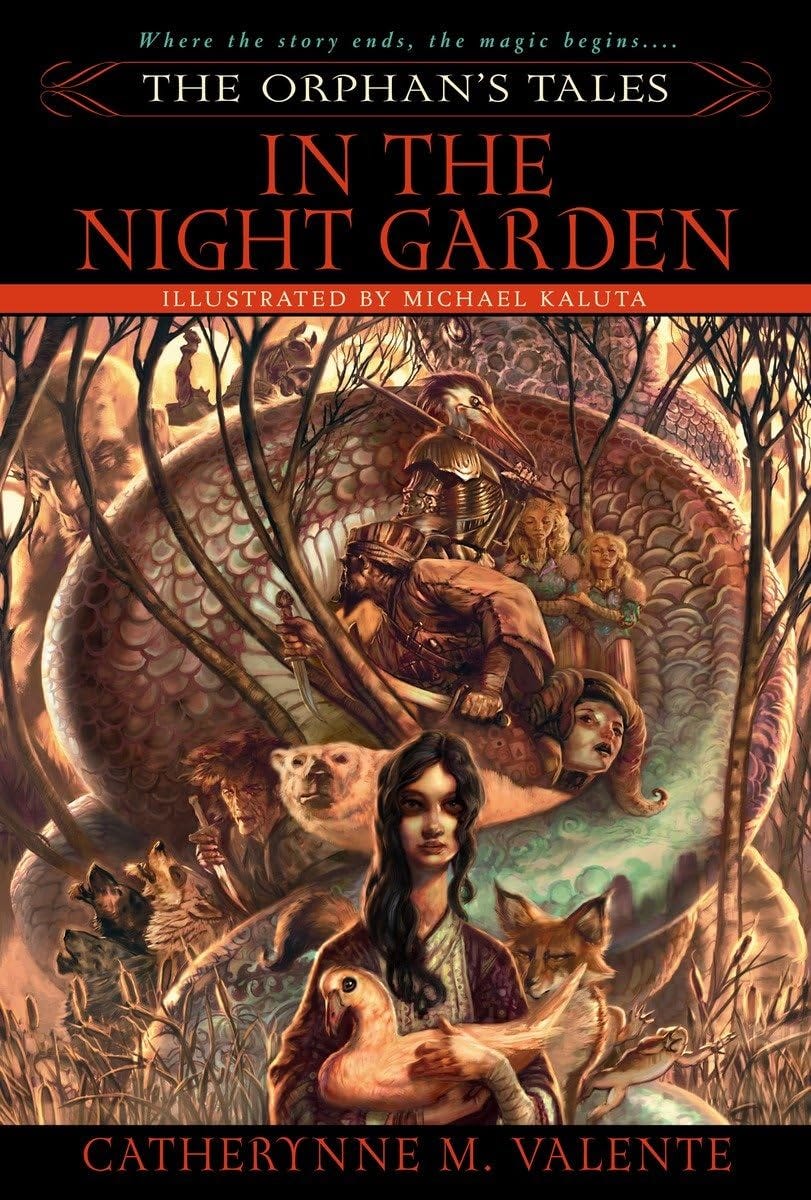
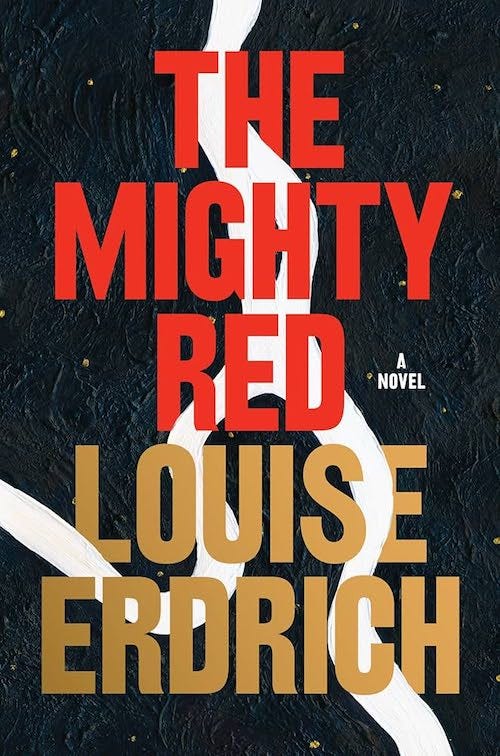
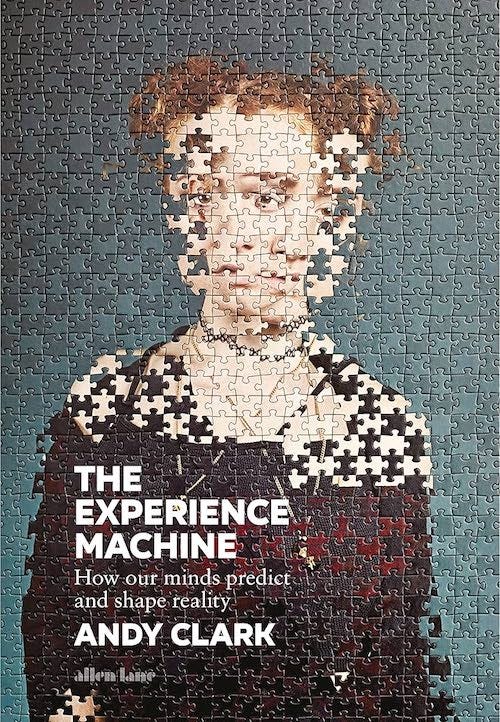
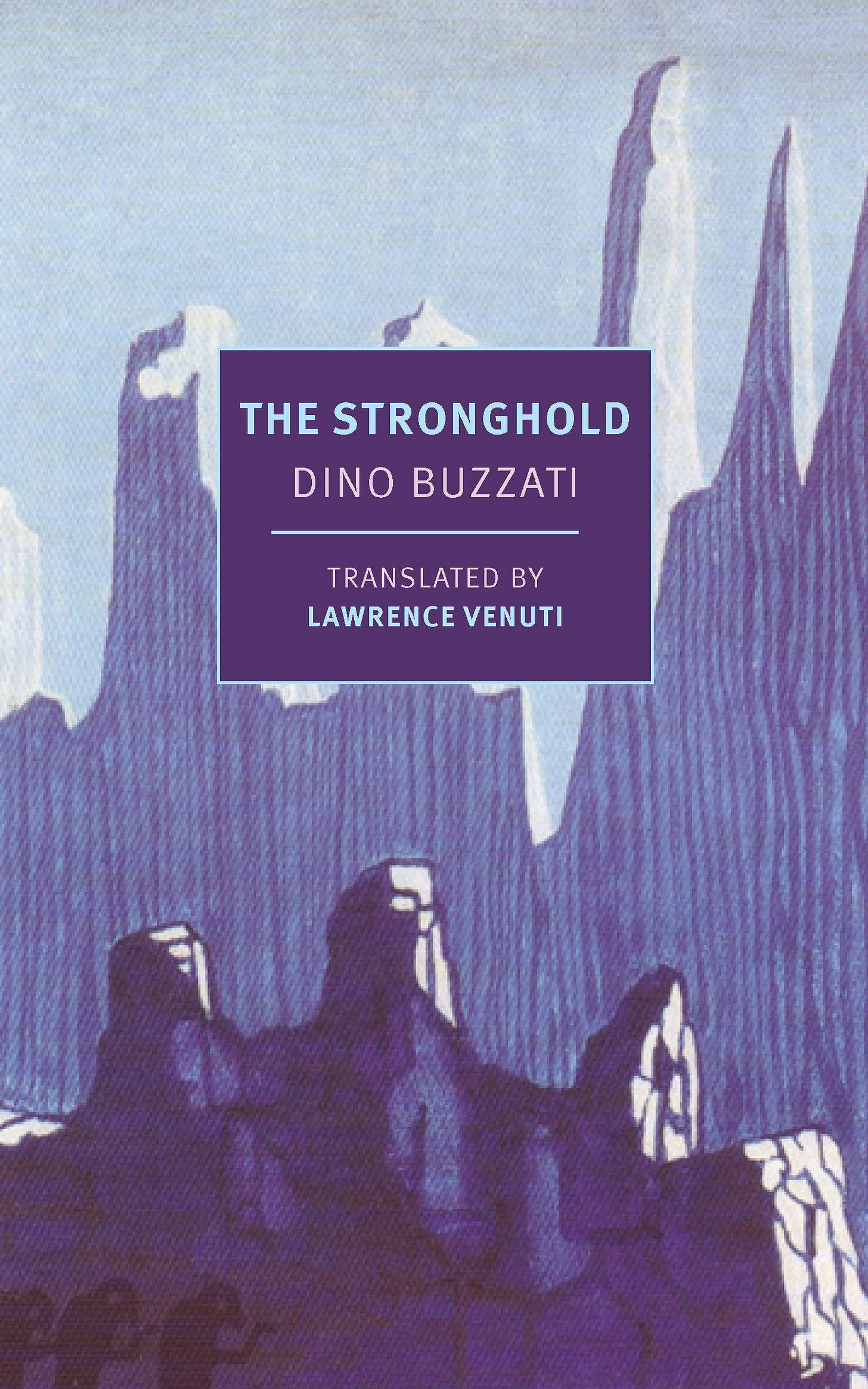



“Why do we equate ‘infuriating to read’ with greatness?” Well said! I think about this all the time lol
Really enjoyed your review of Infinite Jest and DFW, very interesting.